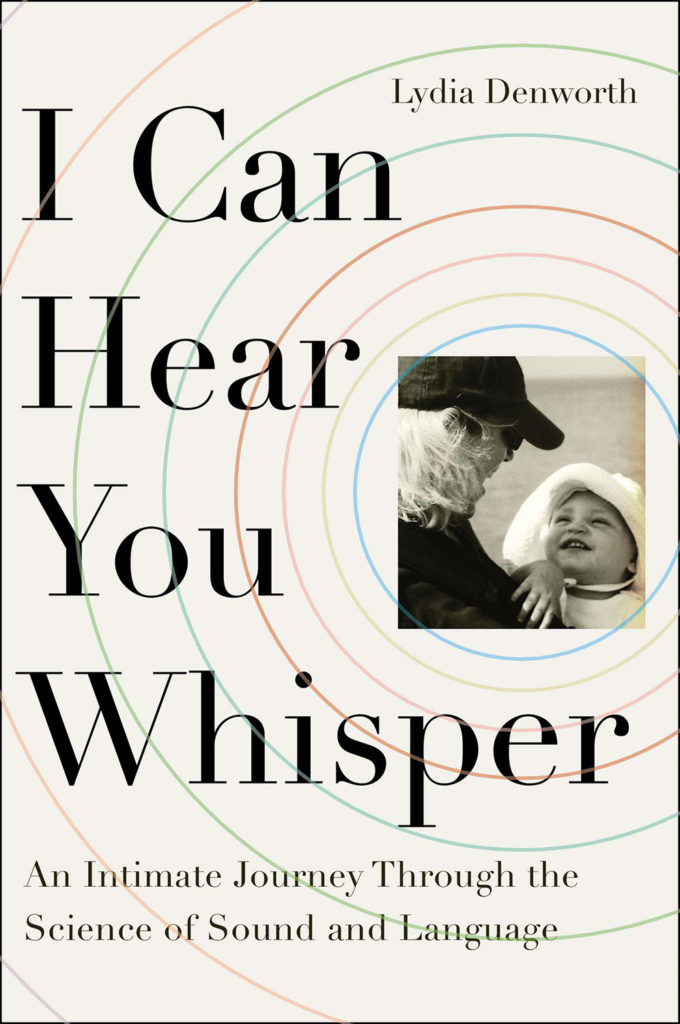I Can Hear You Whisper
 Buy the Book: Amazon, Apple Books, Barnes & Noble, IndieBound, Audible
Buy the Book: Amazon, Apple Books, Barnes & Noble, IndieBound, AudiblePublished by: Plume
ISBN13: 978-0142181867
Overview
My toddler was not learning to talk the way his brothers did… Was something wrong? My search for answers in the science of sound and language is a journey into the mysteries of the human brain.
My third son, Alex, was nearly two when he was identified with significant hearing loss that was likely to get worse. My sweet boy with the big brown eyes had probably never heard my lullabies.
I knew the importance of enrichment to the developing brain, but had never contemplated the opposite: Deprivation. How would a child’s brain grow outside the world of sound we too often take for granted? How would he communicate? Would he learn to read and write—weren’t phonics a key to literacy? How long did we have until Alex’s brain changed irrevocably? In my drive to understand the choices—starting with the politically loaded debate between American Sign Language and the controversial but revolutionary cochlear implant—I soon found that every decision carried weighty scientific, social and even political implications. As I grappled with the complex collisions between the emerging field of brain plasticity, the possibilities of modern technology and the changing culture of the deaf community, I gained a new appreciation of the exquisite relationship between sound, language and learning. It became clear that Alex’s ears—and indeed everyone’s—were just the beginning. Hearing, through sound, is inextricably linked to language and through language to literacy.
Weaving together tales from the centuries-long quest to develop the cochlear implant and simultaneous leaps in neuroscientific knowledge against a tumultuous backdrop of identity politics, I Can Hear You Whisper shows how sound sculpts our children’s brains and the life changing consequences of that delicate process.
Praise
“I Can Hear You Whisper is a triptych of reportage, popular science, and memoir. As reportage . . . it’s both timely and rigorous . . . As popular science, it’s enthralling . . . As a memoir it is tender and involving.”
—The New York Review of Books
“Painstakingly researched and emotionally charged.”
—People
“Writing with clarity and style, Denworth serves as a capable guide to a world few with full hearing are fully aware of . . .A skilled science translator, Denworth makes decibels, teslas, and brain plasticity understandable to all.”
—The Washington Post
“So comprehensive, wide-ranging, and well-written that it is essential reading . . . A fascinating and magisterial book.”
—Michael Chorost, author of Rebuilt: My Journey Back to the Hearing World and World Wide Mind: The Coming Integration of Humanity, Machines, and the Internet
“In this moving and informative book, former Newsweek reporter Denworth recounts her emotional and intellectual quest to help her deaf infant son hear. . . many luminous moments . . . This is a book that parents, particularly of deaf children, may find indispensable.”
—Publishers Weekly
“Denworth employs her skills as a researcher [and] understands how to keep readers engaged . . . All parents will recognize the moments of both terror and pride that mark the journey; parents of deaf children will garner both information and insights.”
—Kirkus Reviews
“Eloquently explains how hearing works and fails . . . An excellent book.”
—Booklist
“Lydia Denworth has written a beautiful book . . . Her quest to acquire every shred of knowledge she can to help her deaf son is an odyssey that all parents who worry about their children (i.e. all parents) can intimately relate to. Her discoveries about the workings of language and the intricacies of brain development will change the way you think about hearing, speaking, and selfhood.”
—Judith Warner, New York Times best-selling author of Perfect Madness: Motherhood in the Age of Anxiety
“Denworth provides a lucid, engaging, and thoughtful description of the science of hearing. If you are interested in hearing, speech, and language—as a parent, educator, clinician, or scientist—this book fills an important gap and is a terrific read. Careful about the science and sensitive to the psychological complexities, Denworth provides a masterful account of the path from ear to the brain, from sounds to words.”
—David Poeppel, Professor of Psychology and Neural Science, New York University
“Read this if you have ears or ever interact with humans. What a moving and brilliant tour of the scientific, emotional and political landscape of hearing impairment. As a reader, I’m grateful to Lydia Denworth. As a writer, I’m jealous.”
—David Shenk, author of The Genius in All of Us and The Forgetting
“I Can Hear You Whisper is both an affecting and searching personal story and a fascinating job of science reporting . . . Lydia Denworth’s son Alex, the beautiful boy at the center of the personal story, is lucky to have a mother like her. The rest of us are lucky to have such a perceptive, lucid, and touching book.”
—Richard Bernstein, author of A Girl Named Faithful Plum
“Lydia Denworth’s beautiful personal account and thorough investigation connect the dots between her son’s hearing loss, the essential import of spoken language on the developing brain, and what parents, doctors, and teachers can gain from a deeper understanding of how the mind acquires language.”
—Dana Suskind, MD, Professor of Surgery at the University of Chicago and Director of The Thirty Million Words Initiative